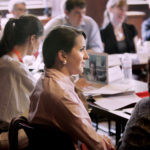A friend recently told me she wanted to apply to law school. After a few years of staying home with her children, she yearned for an intellectual outlet. I struggled to suppress the urge to tell her, “Then don’t go to law school.” Or, at least, “Don’t go for that reason.”
I, too, was lured into law school by the expectation of three years of careful study, robust debate, and the symphony of minds sharpening minds in lecture halls and seminar rooms. But my first semester felt more like an ice bath than a refreshing sip from the font of wisdom: I quickly learned that law school is more professional boot camp than intellectual playground.
My friends in academia confirm that this is largely true of university lecture halls as well. The idyll and romance of a doctoral program are alluring, no doubt. But after the Great Law School Disenchantment of the early 2010s, it seems ever clearer to me that a higher degree, whether in academia or a discipline like law, is a credential. This is not, in any way, meant to diminish the work of academics, scholars, lawyers, or other professionals who endure the undeniable rigors of pursuing a higher degree. Many are indeed pulled to make an academic pursuit their life’s work, and this is a noble calling. But for the rest of us, a higher degree is not a gatekeeper to an intellectual life in some form. Indeed, an intellectual project may not be the whole of our lives, and certainly not the thing that supports our families financially. But to think sharply, read widely, and move through the world with a spirit of wonder? This, I believe, is a call to all.
An intellectual project may not be the whole of our lives, and certainly not the thing that supports our families financially. But to think sharply, read widely, and move through the world with a spirit of wonder? This, I believe, is a call to all.
Start your day with Public Discourse
Sign up and get our daily essays sent straight to your inbox.A Stream Narrowly-Hemmed-In
The twentieth-century French priest A. G. Sertillanges is the ultimate evangelist for the intellectual life. His “little red book,” The Intellectual Life: Its Spirit, Conditions, Methods, has been a clarion call to clergy and lay, scholarly and blue-collar alike, to engage in the challenging yet generative work of the mind. To be an intellectual, Sertillanges urges in his little red book, requires commitment. For those willing to do the work, the rewards are rich. “To father some intellectual work,” he writes, “is to sow a good and fruitful seed. Every work is a wellspring.”
Yet Sertillanges acknowledges that merging intellectual pursuits with an income-generating career is a gift and a privilege not available to everyone. For many, the work of the mind must instead be grafted onto our other work, both within and outside the home.
Sertillanges delivers welcome news to those of us in this category. He writes that absolute liberty in time and mental space, which those whose careers are dedicated to intellectual work enjoy more than those who have to find spare time for it, are far from necessary to sharpen the intellect and invite the sense of wonder necessary for it to grow. “If genius is not necessary for production,” he writes, “still less is it necessary to have entire liberty . . . liberty presents pitfalls that rigorous obligations may help to avoid. A stream narrowly-hemmed-in by its banks will flow more impetuously.”
Those of us whose work is not necessarily in the academy or the mind but in the home, the courtroom, or the boardroom should find hope in Sertillanges’s words. Just as we don’t need credentials to live an intellectual life, we also do not need unlimited time. We do, however, need to commit to moving through the world differently than we are accustomed.
Resisting the Urge to Optimize
Some may be called to pursue a higher degree. But all are called to challenge and confront the ways our culture has formed us.
There is no shortage of content that pushes the benefits of hacking our ways to a “better” life. Simpler. Richer. Healthier. More fun. Less stressful. Or, in keeping with the recent social media trend: “#softer.” There are ample texts that teach us how to plan a great vacation, tell us where to find the best latte, show us how to achieve glowing skin or shave forty-five minutes off of our daily domestic tasks. But few teach us how to form our consciences. Formed in this cultural furnace, we face a unique challenge: in fixating on secondary goods, we can easily lose sight of the primary ones. An obsession with devising ways to create more ease, efficiency, luxury, leisure, and pleasure in our lives can hamper the type of free, unburdened thinking that allows intellectual insights to take root.
I’ve been thinking about how this applies to people in my vocation: motherhood. In doing so, I’ve noticed how much good can come from resisting the cultural urge to optimize, streamline, and render our lives hyper-efficient so we can squeeze as much pleasure as possible out of it. An excessive preoccupation with productivity as a primary good stymies our creative thinking, making us feverish and shallow. It fools us into making the secondary goods of ease and comfort the very marks of the Good Life.
In contrast, welcoming human imperfection in its manifold expressions is a boon for those of us who lack the privilege of full-time scholarship, those of us who operate more like Sertillanges’s narrowly-hemmed-in stream. It is not in spite of, but thanks to, the inherent inefficiencies of our rich and often chaotic lives that so many of us can enjoy the pursuit of intellectual enrichment. In fact, the unexpected monkey wrenches life throws in our plans, perhaps more than anything else, invite us to stretch our minds to places of wonder rather than defaulting to our baser tendencies of frustration and irritability.
Consider a few examples: the baby who wakes, hungry, in the middle of the night; the delayed flight; the rush-hour traffic. These can all be an invitation to contemplation. When forced to a standstill, we might make a connection between concepts or ideas we’ve read about, heard, or studied; some unique insight might dawn on us. Or, when we choose to sacrifice a secondary good (order, perfection, something that will placate our baser natures) for something more intrinsically good (a long conversation, picking up a book, listening to good music), we start to strengthen a certain muscle: a thinking one, a reflective one, one that thrives not on cheap dopamine hits but in beholding things that are good, and true, and lovely, and noble, no matter how seemingly inconvenient or inefficient they may be.
Many may be called to pursue a degree. But all are called to challenge and confront the ways our culture has formed us.
Be a Generalist
Our digital world encourages niching and branding to stand out and succeed. Successful in any field, particularly one that involves outward-facing work like writing, entrepreneurship, or journalism, requires aggressive self-branding. And in our human frailty, it’s enormously tempting to strive to spin our images into something publicly presentable rather than set out to do the work we find so worthy.
Sertillanges (along with many others) urges us to fight our faulty wiring and to just do the work: a far more rigorous task than the planning, scheming, and self-presentation that occupies so much of our time and mental energy.
Work cures the pains of work and those of the worker; it is the foe of annoyances, sickness, and sin; it lifts us into a high region where the vexations of life and the weakness of the body find alleviation. The urge it rouses, the direction it gives our energy, are an anodyne for worry and release us from wretched preoccupations.
In Sertillanges’s view, the intellectual life is not about how we present ourselves, the perception we create, package, and sell. It is a disposition of the mind, heart, and soul.
An outgrowth of branding culture is the issue of specialization: the professional world pushes us to specialize, to find a niche, to choose one discrete issue and become an expert on it. From a purely economic perspective, this may indeed lead to greater, faster success. But although hyperspecialization, in some cases, may indeed bring riches, it is intellectually and spiritually impoverishing.
Thinkers like Sertillanges advocate cultivating a broad array of interests (poetry! music! art!) because it’s in this array of interests and immersion in a variety of media and modalities that we start to form webs of meaning and connection in our minds. Something we read reminds us of something someone once said in conversation, and our thoughts on a particular subject start to cohere. Different modes of experiencing the world, from music and film to literature and liturgy, are unique expressions of the same reality—and we would do well to welcome them all.
The Spring Which Quenches and Yet Ever Renews
In the spirit of Sertillanges, no matter how many letters follow our names, no matter how we spend our time from nine to five on Monday through Friday, we, too, can lead an intellectual life. Sertillanges urges us to “learn to make the best use of that limited time; plunge every day of your life into the spring which quenches and yet ever renews your thirst.”
May we all learn to plunge ourselves into that spring no matter our age, occupation, or vocation, whether our intellectual playground is the classroom or the lecture hall, the home or the courtroom.
Image by “Halfpoint” and licensed via Adobe Stock. Image resized.













